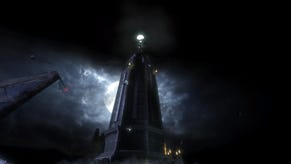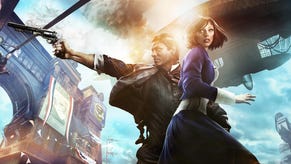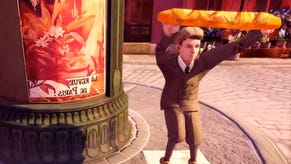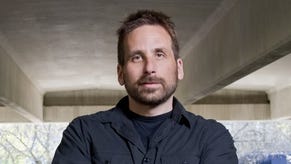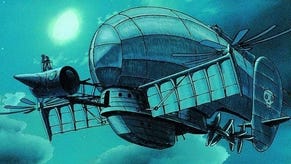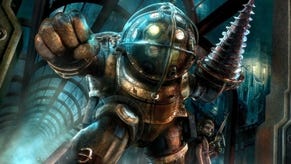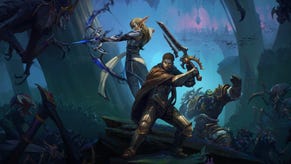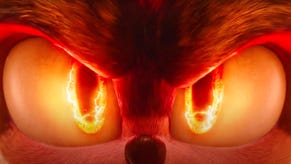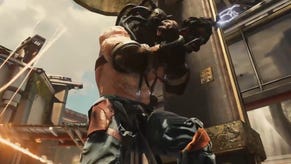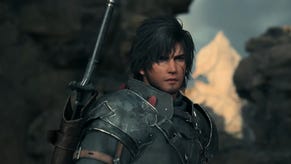BioShock Infinite announced
Seven questions with Ken Levine inside.
Irrational Games has announced BioShock Infinite, due out for the PC, PlayStation 3 and Xbox 360 in 2012.
It's a first-person shooter set in 1912 on Columbia, a huge city in the sky.
We've been over to the US to see the game, and returned with a preview, an interview with BioShock creator Ken Levine, screenshots, and a reveal trailer.
Phew.
If that wasn't enough, we've got a "seven questions with Ken Levine" fact sheet sent over from 2K Games for your viewing pleasure. Thank you, kindly.
Can you tell me a bit more about the new city, Columbia?
Unlike Rapture, Columbia wasn't a mystery hidden away from the eyes of the world. To the contrary, Columbia was the moon landing of 1900 – an expression of American genius designed to demonstrate to the world by example the founding democratic principles of the United States. "See the city above the clouds, the product of American ideals, endeavor and industry. Could your country create something like THIS?"
However, what started out as the Apollo Project became the Death Star. The city, which turns out to be armed to the teeth, goes off-mission, becomes embroiled in a violent international incident... and promptly disappears behind the clouds.
Can you tell me a bit more about who you play?
The player plays the role of Booker DeWitt, a disgraced former Pinkerton agent. He's known as a man who gets things done... for a price. A mysterious figure, who seems to know how to locate Columbia, hires DeWitt to go to infiltrate the lost city and retrieve a young woman who's been held there since she was a child.
When DeWitt arrives in Columbia, he has little problem locating Elizabeth, but the city has changed in its years hidden amongst the clouds. And as it turns out, Elizabeth isn't just anybody – she's squarely at the center of a conflict that has torn apart the city. As she and Booker engage in a desperate struggle to escape, they learn that they must trust one another and combine their unique abilities to survive.
Can you tell me how you went about making this new game?
Let me start by saying that there were no sacred cows when we started work on this game. Everything in BioShock Infinite is there for a reason, not simply because it was featured in a previous game. BioShock Infinite was designed from scratch; there's not a single line of code we wrote or asset we created that existed in a previous BioShock game.
We wanted to create a world unlike Rapture, one that was literally floating, that was crumbling underneath you and affecting your gameplay. We had to develop new technologies to bring that to life.
You also know who you are in this game – you have an identity – and in Elizabeth you have a meaningful gameplay companion. There's a larger variety of game spaces and a sense of speed and scale and vertigo unlike anything you have ever seen before, in any game. You'll find yourself in firefights with huge groups of enemies in both intimate environments and in massive duels to the death.
We're making an entirely new statement about what it means to be a BioShock game.
What would you say defines a BioShock game?
It should be a world like nothing you've seen before – in any other game or a movie or anything like that. That's the most important thing, the core thing that makes a BioShock game a BioShock game.
I think once you get beyond that, probably it's a first-person shooter next.
Further than that, when the gloves really come off, it's about what we want to do creatively.
One of the great things about the first BioShock was that not every character attacked you on sight. How will that work in this game?
We showed that idea of "neutrality" in the demo. When you walk into the bar, the guys there just look at you. They don't attack right away, which is very deliberate. In the original BioShock we really loved how Big Daddies wouldn't immediately attack and moments like the one when you came up the elevator and saw the woman singing to her gun in the baby carriage. You weren't sure what would happen when you approached.
So when designing BioShock Infinite, we thought "wouldn't it be great if you walked into a room in this game and you didn't necessarily know the dispositions of the people in it? Are they going to sit there? Are they going to attack you? What might set them off?" We really wanted to have a notion that not everyone in the city was automatically hostile towards you. Instead it has more of that "Wild West" feel where you walk into a bar with your hand on your pistol and you're not sure what's going to happen to you. That's what we try to get across in that bar scene in the gameplay demonstration and that's going to be a major component of how this game feels.
Can you tell me how the weapons in BioShock Infinite are different from previous BioShock games?
There are obviously going to be some different weapons and also more weapons. You're not going to be restricted to just the eight weapons of your radial. There's a famous saying: "When all you have is a hammer, everything looks like a nail..." That's kind of how it was in the original BioShock. You walked down a tight, restricted corridor with Electrobolt in one hand and the shotgun in the other and that was an effective way you could deal with most of the enemies.
One of the reasons we wanted to really expand the scale of the environment and the number of enemies was to create situations where certain tools would have clear strengths and weaknesses based upon what you were up against. There is no perfect combination or an ideal set of tools, and there's going to be a larger variety of weapons and powers. We wanted to show that even familiar weapons like the shotgun are not always the right tool for the job. And the sniper rifle (unlike BioShock's crossbow) actually has a specific function because of the extreme scale of our environments.
Everything in BioShock had consequences. Can you give an example of how this might play out in this new game?
In every game Irrational makes, we endeavor to make the player feel like their actions are consequential – it's part of good game design. So you'll find plenty of examples when you come to play BioShock Infinite – you'll have to wait to discover exactly how they play out. If you're asking about Elizabeth, obviously you can see that when she helps you, it takes a toll on her. You saw the blood running out of her nose, you saw how it exhausted her and that's something that's certainly important in your relationship with her. You're not a super hero and she's not a super hero, and you're both up against a very difficult challenge that pushes you to the extreme.
This is a world where there are consequences. This is not a world where people toss around super powers that come without costs. We're telling the story of real people caught in an unreal situation.


